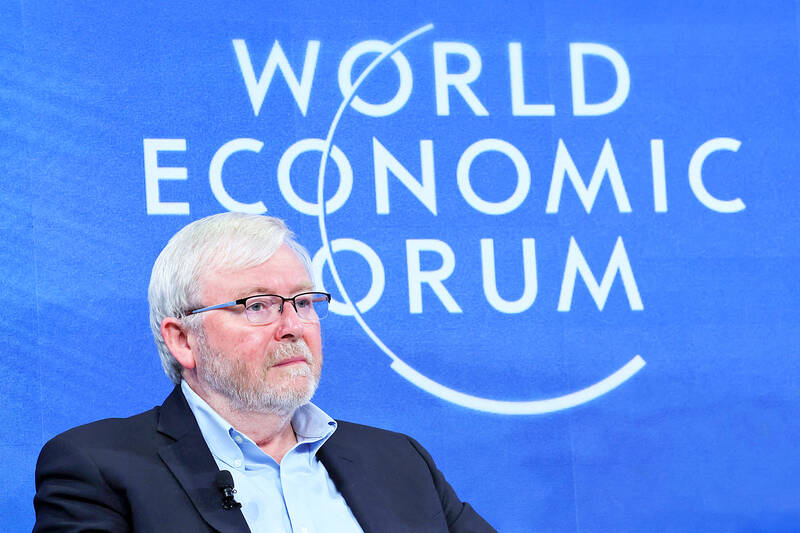The global consequences of a war over Taiwan would be as great as the impact of World War II, making the world “a radically different place,” Australian Ambassador to the US Kevin Rudd on Thursday.
If Chinese President Xi Jinping (習近平), who turns 71 this month, wants to achieve “final national unification” with Taiwan, he would likely act in the next decade before he reaches his 80s, Rudd said in a speech in Honolulu.
“We would be foolish to ignore the increasing clarity of China’s military signaling, including the pattern of its most recent military exercises,” said Rudd, who was twice Australian prime minister in the previous decade.

Photo: Reuters
Whether China acts would depend on its perception of the strength of US deterrence, he said.
The US has expressed concern about Chinese military activity near Taiwan, including after the presidential election and the inauguration of President William Lai (賴清德) last month.
Taiwan and the US have no official diplomatic relationship, as Washington formally recognizes Beijing, but is bound by law to provide Taiwan with the means to defend itself and is the nation’s most important international backer.
The US recognized that if China was successful in annexing Taiwan, it would impact US credibility and have “profound, and potentially irreversible effect on the perceived reliability of US alliances worldwide,” Rudd said.
The US, China and Taiwan have a common interest in avoiding open military confrontation on the future of Taiwan, said Rudd, a China academic who was president of the Asia Society in New York until last year.
“The economic costs, domestic political impacts and unknowable geostrategic consequences that such a war would generate would likely be of an order of magnitude that we have not seen since the Second World War,” he said.
“Whatever the outcome (a US victory, a Chinese victory or a bloody stalemate), the world is likely to become a radically different place after such a war than it was before,” Rudd said.

‘ABUSE OF POWER’: Lee Chun-yi allegedly used a Control Yuan vehicle to transport his dog to a pet grooming salon and take his wife to restaurants, media reports said Control Yuan Secretary-General Lee Chun-yi (李俊俋) resigned on Sunday night, admitting that he had misused a government vehicle, as reported by the media. Control Yuan Vice President Lee Hung-chun (李鴻鈞) yesterday apologized to the public over the issue. The watchdog body would follow up on similar accusations made by the Chinese Nationalist Party (KMT) and would investigate the alleged misuse of government vehicles by three other Control Yuan members: Su Li-chiung (蘇麗瓊), Lin Yu-jung (林郁容) and Wang Jung-chang (王榮璋), Lee Hung-chun said. Lee Chun-yi in a statement apologized for using a Control Yuan vehicle to transport his dog to a

Taiwan yesterday denied Chinese allegations that its military was behind a cyberattack on a technology company in Guangzhou, after city authorities issued warrants for 20 suspects. The Guangzhou Municipal Public Security Bureau earlier yesterday issued warrants for 20 people it identified as members of the Information, Communications and Electronic Force Command (ICEFCOM). The bureau alleged they were behind a May 20 cyberattack targeting the backend system of a self-service facility at the company. “ICEFCOM, under Taiwan’s ruling Democratic Progressive Party, directed the illegal attack,” the warrant says. The bureau placed a bounty of 10,000 yuan (US$1,392) on each of the 20 people named in

The High Court yesterday found a New Taipei City woman guilty of charges related to helping Beijing secure surrender agreements from military service members. Lee Huei-hsin (李慧馨) was sentenced to six years and eight months in prison for breaching the National Security Act (國家安全法), making illegal compacts with government employees and bribery, the court said. The verdict is final. Lee, the manager of a temple in the city’s Lujhou District (蘆洲), was accused of arranging for eight service members to make surrender pledges to the Chinese People’s Liberation Army in exchange for money, the court said. The pledges, which required them to provide identification

INDO-PACIFIC REGION: Royal Navy ships exercise the right of freedom of navigation, including in the Taiwan Strait and South China Sea, the UK’s Tony Radakin told a summit Freedom of navigation in the Indo-Pacific region is as important as it is in the English Channel, British Chief of the Defence Staff Admiral Tony Radakin said at a summit in Singapore on Saturday. The remark came as the British Royal Navy’s flagship aircraft carrier, the HMS Prince of Wales, is on an eight-month deployment to the Indo-Pacific region as head of an international carrier strike group. “Upholding the UN Convention on the Law of the Sea, and with it, the principles of the freedom of navigation, in this part of the world matters to us just as it matters in the